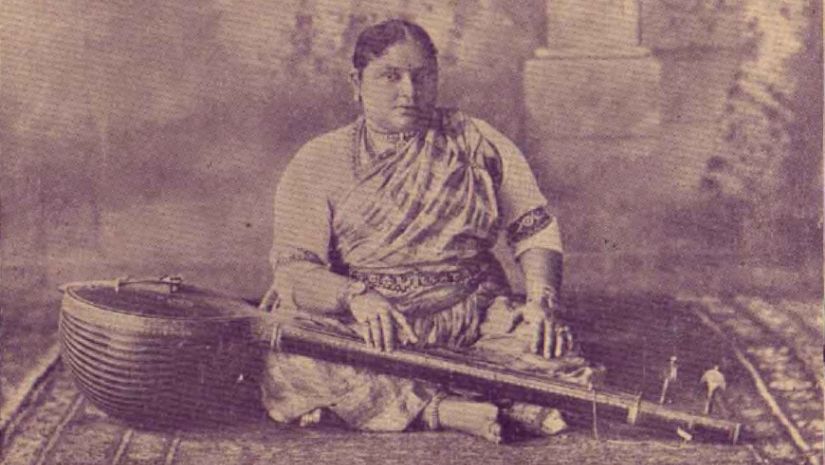In this series,
The Telugu Archive founder Sai Priya Kodidala traces Telugu socio-political history through literature and art. Read more from the series
here . *** In 1910, Bangalore Nagarathnamma, an established musician, scholar and affluent devadasi resurrected the Telugu classic Radhika Santawanam (Appeasing Radhika) written by a prominent 18th century devadasi Muddupalani. She wrote “I cannot let this book go no matter how many times I read it…it is as adorable as Lord Krishna”. A scholar in her mother tongue Kannada as well as Tamil, it was Nagarathnamma’s special enthusiasm and distinct preference for Telugu classics that led her to discover Muddupalani’s work. She came across a reference to Radhika Santwanam in Panigruhita, written by the famous Telugu poet duo Tirupati Venkatakavulu. However, when she obtained an available version of the book at the time, she realised it was full of errors and poorly printed. A friend found an annotated manuscript with great difficulty, and Nagarathnamma compared the original with the available version. Not only was it badly edited but also ‘sanitised’ to exclude the peethika (Prologue) in which Muddupalani describes her literary lineage and scholarly achievements and from entire stanzas within the poem. In 18th century Thanjavur, Muddupalani was a court poetess, distinguished scholar and courtesan of the Nayaka ruler Pratapasimha. Known for their patronage of arts, music and literature, the Nayaka rulers fostered what is today considered the period when Telugu literature flourished. She proudly describes her matriarchal lineage through her grandmother Tanjanayaki, a celebrated devadasi of her times known for her talent, skill and wealth. Muddupalani introduces herself as a woman of unparalleled talent, beauty and patronage to whom epics were dedicated to. (Courtesans had access to scholarship in music, literature and dance and traditionally enjoyed property rights.) Muddupalani’s Radhika Santawanam — a magnum opus with 584 verses — revolves around the relationship between Krishna and his maternal aunt Radha, Krishna’s wedding to Ila and the eventual torment and appeasement of Radha. Unlike common depictions of Radha and Krishna, it focuses on its women, their sexuality and sensibilities. It offers insights into the women’s perspectives — the coming of age, the first sexual experience, the trauma of longing, self-doubt, conflicting emotions of love and hate, and asserting self-respect. Drawn to Muddupalani’s story, her legacy and scholarship which was distinctly similar to her own, Bangalore Nagarathanamma felt the need to bring out the work in its entirety in 1910. She wrote “This work is overflowing with rasamu (aesthetic or taste). As it is not only written by a woman but by a woman who was born into the same community (devadasi tradition) as mine, I intend to edit and publish it in a proper form.” Apart from her disappointment with the censored version, what probably led her to publish it was her urge to defend Muddupalani against comments by Kandukuri Veeresalingam Pantulu, a champion of the women’s movement and a social reformer. In his Andhra Kavula Charitra (1887) Veeresalingam, a staunch supporter of the anti-nautch movement, commented that certain aspects of the book were ‘disgraceful’ and ‘inappropriate’ for respectable women to hear or talk about. He added that while Molla and Mohanangi have written padyakavyamulu (epic poems) before, they were ‘chaste and honourable women’. He dismissed Muddupalani, calling her a ‘prostitute’. Throughout his commentary, he uses derogatory pronouns such as ‘adi’ ‘idi’ and ‘dani’ to refer to her. “Muddupalani is among the women who wrote poetry. She is a prostitute. She wrote Radhika Santwanam in four cantos. Her mother’s name is Muthyalu. She seems to be a mistress of Pratap Simha, ruler of Thanjavur based on her book.” [caption id=“attachment_8132381” align=“alignnone” width=“825”]
 These photos of Bangalore Nagarathnamma were carried by Gruhalakshmi magazine in 1952, 1949 and 1929. Images courtesy Sai Priya Kodidala/The Telugu Archive[/caption]
In 1910, Bangalore Nagarathnamma resurrected the Telugu classic Radhika Santawanam written by a prominent 18th centuey devadasi, Muddupalani. Nagarathnamma, an established musician, scholar and affluent devadasi, was drawn to Muddupalani’s story, her legacy and scholarship — which was distinctly similar to her own.
Advertisement
End of Article


)
)
)
)
)
)
)
)
)



